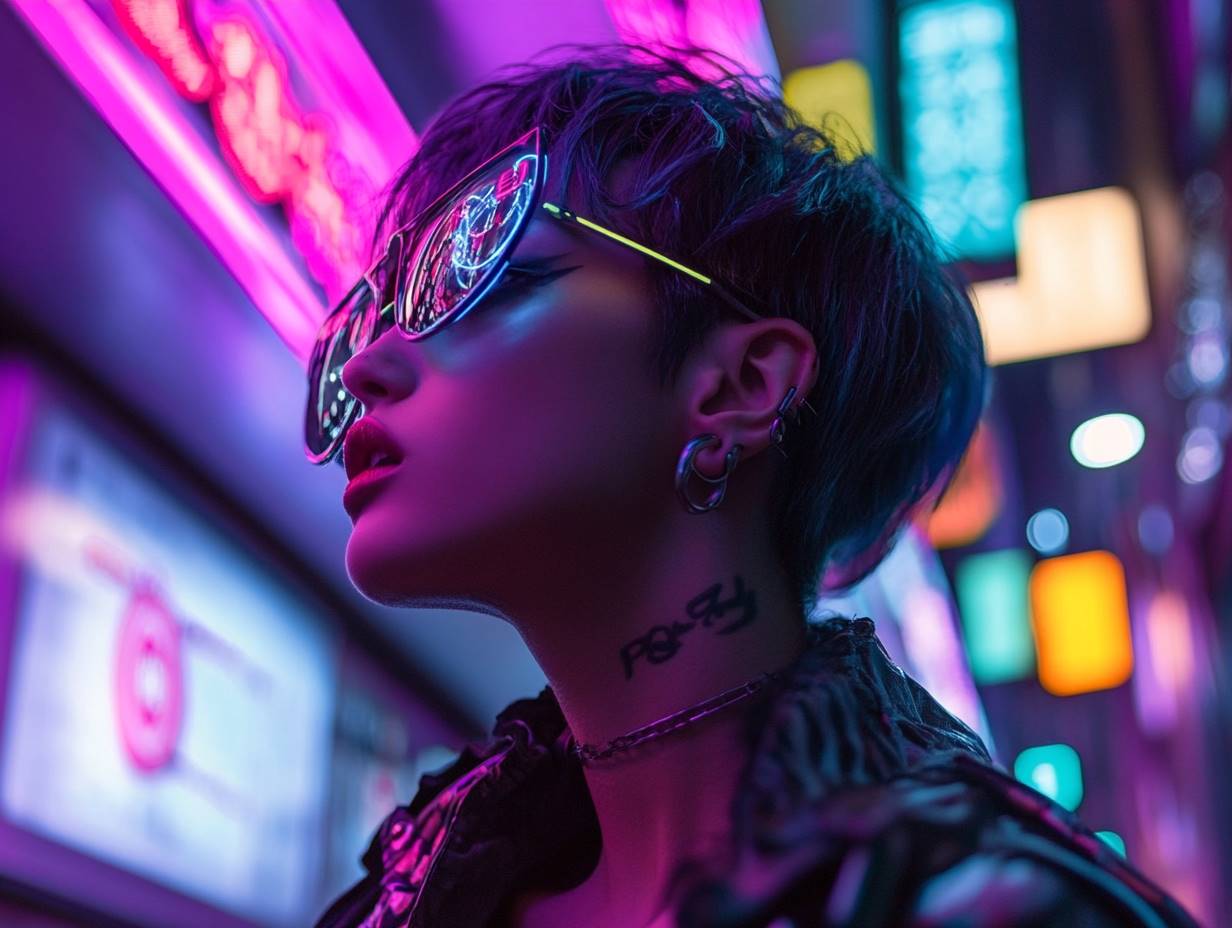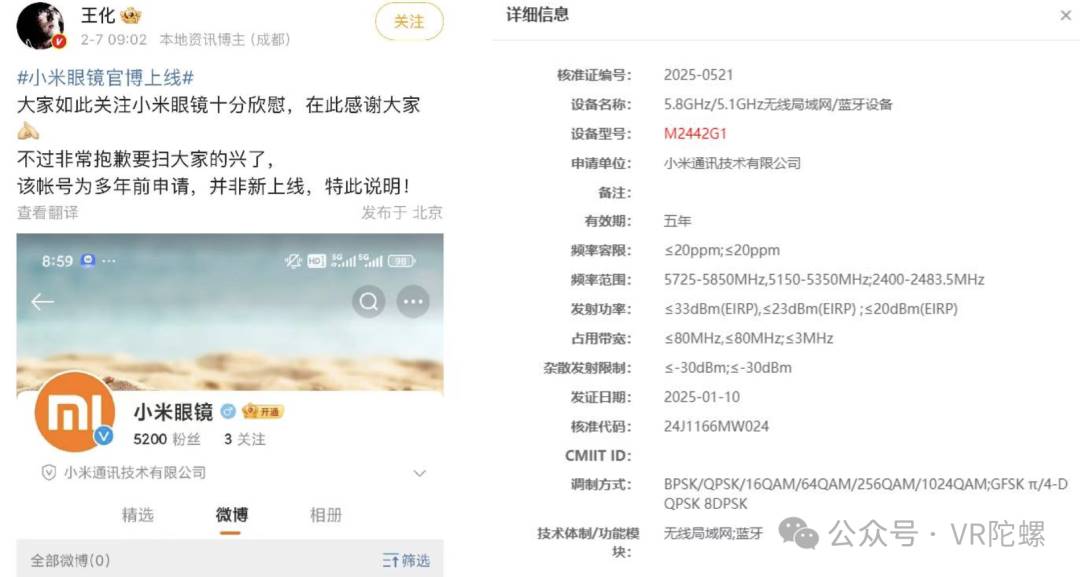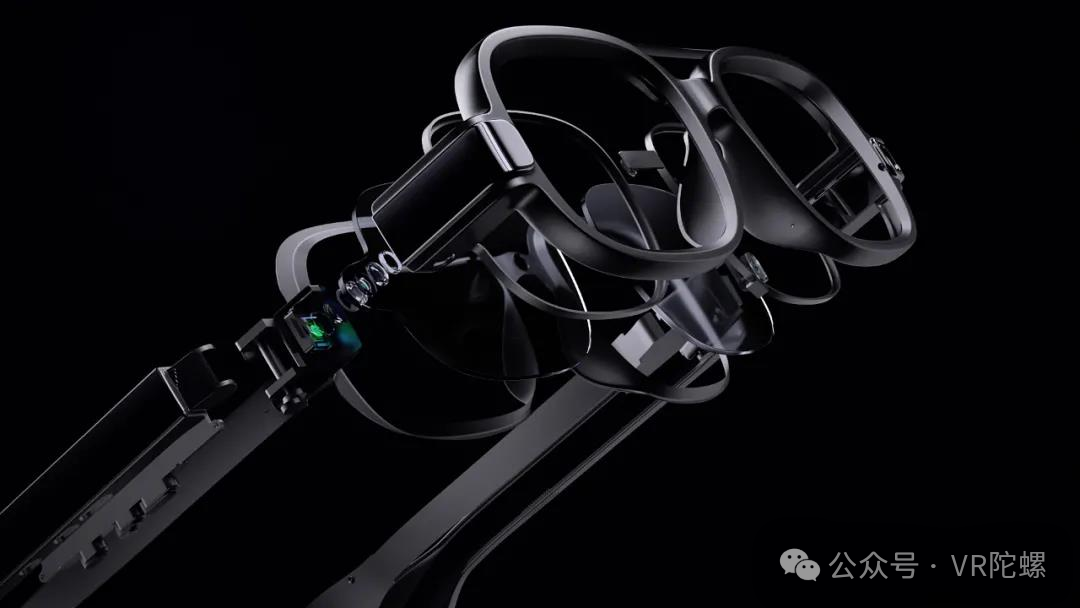
图片来源:由无界AI生成
继小米 SU7 之后,雷军下一个时代爆款,小米 AI 眼镜即将来袭。
2024 年,AI 眼镜市场几乎是被 Ray-Ban Meta 承包的一年,而伴随着中国厂商的集体发力、蜂拥而至,2025 年, AI 眼镜将迎来产品集中爆发阶段。
而这些中国厂商中,「小米」无疑是最抢眼的一家。不管是从小米本身的品牌定位、庞大的用户基础、完善的市场渠道,还是从小米在 AI + 硬件上的落地经验来看。诚然,小米 AI 眼镜的发布,有望推动中国 AI 眼镜市场再上一个梯级。
小米AI眼镜发布在即,一场“旧账号”引发的市场狂欢
小米 AI 眼镜发布在即,市场消息不断。
尽管小米集团公关部总经理王化近日已紧急辟谣,称“小米眼镜官博是多年前注册,并非新上线”,但这一回应反而为市场留下了更大的想象空间。从其非常官方的话术中不难看出,王化并未直接否认产品发布的可能性,仅强调账号并非新上线,暗示相关进展可能仍在推进中。
此外,在此期间,小米 AI 眼镜已通过工信部入网许可(型号M2442G1)的消息也被传得沸沸扬扬。但王化并未对此做出回应,似乎已悄然说明了一切。

事实上,早在 2024 年 11 月,业内便传出小米与歌尔股份合作开发新一代 AI 眼镜的消息,计划于 2025 年第二季度米粉节期间发布,雷军预计小米AI眼镜年销量在 30 万台以上。
陀螺君去年从供应链人士处获悉,小米 AI 眼镜或将分为两个版本:一款搭载摄像头模块的 AI 眼镜,以及一款纯音频交互的基础版(或为早期测试版),剑指大众市场。
另外,眼镜在部分设计上,会有些许创新,用于增强 AI 眼镜的续航能力。这一策略基本延续了小米原有“极致性价比”的 3C 产品基因,同时也从产品力上直接对标 Ray-Ban Meta。
AI眼镜,何以成为小米的下一个增量选择?
小米入局 AI 眼镜,寻求市场新增量。
以互联网手机起家的小米从 2010 年成立以来发展迅猛,其最新数据显示,市值已突破万亿,从“最年轻的世界 500 强企业”,正式迈入全球 100 强企业名单,超越华为、松下、LG 等巨头。
小米集团不断增长的背后,一方面自然离不开以手机为核心的各类技术、生态的研发投入,另一方面也离不开“小米杂货铺”。“小米杂货铺”涵盖了丰富的 IoT 与生活消费产品,这些产品在小米集团的营收中占据重要地位,从小米集团 2024 年第三季度财报数据中可窥一二。
小米集团 2024 年第三季度财报显示,其 IoT 与生活消费产品收入达到了 261 亿元,同比增长 26.3%,毛利率为 20.8%,同比上升 3.5个 百分点;相对而言,智能手机收入虽然达到了 475 亿元,但毛利率已下跌至 11.7%,同比下调 4.9 个百分点。此外,新晋智能电动汽车业务也十分显眼,业务收入达到 97 亿元,环比增长 52.3%。
因此,在智能手机市场已然触顶,毛利率持续下滑的今天,不断扩充以小米生态为核心的“一方杂货铺”,提高营收与利润,也就成为了小米持续增长的必选项。

在“小米一方杂货铺”的阵容中,过往消费电子产品逻辑几乎都以手机、小爱音箱为核心做生态性发散,结合当下消费者对智能穿戴设备日益增长的需求,以及 AI 技术在便携设备上的深度应用趋势,AI 眼镜无疑是个不二之选。
AI 眼镜符合小米业务增量的战略需求,以及以手机为核心的场景拓展。一方面,眼镜作为离人类五官最近的可穿戴设备,在第一人称视角的信息采集与 AI 语音交互上拥有天然优势。基于手机算力与 AI 云端交互,可拓展实时翻译、图像识别、智能搜索、个人助理等各种多元化 AI 场景。
另一方面,Ray-Ban Meta 2024 年销量突破百万台,验证了市场对“轻量化 AI 眼镜”的需求潜力,而目前中国 AI 眼镜市场还处于起步阶段,拥有较大增长空间。研究机构 IDC 预计 2025 年全球 AI 眼镜市场出货量将达到 1280 万副,同比增长 26%。其中,中国 AI 眼镜市场 2025 年出货量预计为 280 万副,同比增长高达 107%。
从「AR探索版」到「AI眼镜」落地,小米蓄势已久
事实上,小米与 Meta 一样,在下一代计算平台 AR 技术上布局已久(不含米家生态链产品)。早在 2021 年,小米就发布了一款 Micro-LED+衍射光波导的 AR 眼镜概念产品;2023 年,小米还官宣了小米无线 AR 眼镜探索版,基于 Micro-OLED+自由曲面光学。
从技术成熟度来看,小米前几年发布的 AR 眼镜产品都已具备高度落地性,在市面上也能找出不少初创公司的类似产品。不过,小米并未着急进行商业化,对于大厂而言,一个行业没有爆款产品之前,冒险进入机会成本可能过高。
直到 AIGC 热潮, 以及 Ray-Ban Meta 的爆发,才让小米更加坚信这个赛道。虽说 2025 年要发布的 AI 眼镜之前 AR 眼镜的「精简版」,不过在生成式 AI 的加持下,其通过语音以及摄像传感器,已经可以带来诸多实用场景。并且,更为重要的是,AI 眼镜是小米认为完全可商业化落地的 C 端产品。
对于小米而言,AI 眼镜如同 Meta 在智能眼镜上的布局思路一样,同样可被视为未来 AR 眼镜的过渡型产品。从市场趋势来看,当下消费电子领域对 AI 轻量化、便携化、高效化的设备需求激增,AI 眼镜凭借其在语音交互、第一人称视觉等方面的初步探索,正好契合了这一发展方向,为迈向功能更完善、体验更高级的 AR 眼镜市场奠定用户认知与技术应用基础。

小米单目AR眼镜
此外,值得注意的是,相对于普通初创公司而言,手机厂商做 AI 眼镜的的确确拥有一定技术优势。早在去年的稿件中《AI眼镜 | 供应链易入,高分产品难求》,陀螺君就已强调,对于 Ray-Ban Meta 类 AI 眼镜而言,「音频」与「影像」是最核心的板块,也是眼镜最难做的两大板块。
一个简单的「语音交互」,就会涉及多 Mic 外采、降噪收音等系列音频算法与硬件的结合。「影像拍摄」更是直接关乎一款眼镜的风评与市场销量,不得不加以重视,由于没有像手机那样的手动对焦,AI 眼镜需要实现全自动对焦、自动色彩、感光度优化调整等,对于初创企业来说,压力并不小。在这其中,芯片的选择以及成本的权衡也非常重要。
而诸如此类降噪算法、拾音算法、影像算法、AI 语音交互,小米等手机大厂早已在 TWS 耳机、智能音箱、智能手机上实现了技术沉淀与探索。相对于初创公司而言,需要补齐调试的板块要少得多,且在软件生态层面,还能做到系统级权限,全面调用手机生态,拥有较强技术优势。如此这般,也让我们更加期待小米的 AI 眼镜,究竟会做出怎样的技术差异化。
小米AI眼镜,中国AI眼镜破局导火索?
2025 年,AI 眼镜赛道已挤满巨头:Meta 计划年内推出 6 款 AI 可穿戴设备,三星、华为、OPPO、雷鸟创新、星纪魅族、百度、Rokid 等厂商亦虎视眈眈。面对全球市场范围内的“百镜大战”,小米 AI 眼镜的发布,或有望引发中国市场的鲶鱼效应。
从市场格局来看,当前中国 AI 眼镜市场销量远低于海外,但行业热度高涨。从营销角度上来看,国内市场始终缺少一款与 Ray-Ban Meta 一样的现象级爆品,去增强消费者认知,提升用户对于 AI 眼镜的购买欲望。
而小米自身的品牌优势不容小觑。多年来,小米凭借高性价比的产品和丰富的生态链,在消费者心中塑造了一个个传奇,庞大的用户基础也为小米 AI 眼镜的推广提供了天然的土壤。
如此市场背景之下,小米 AI 眼镜的入局,无疑将进一步扩充国内 AI 眼镜行业市场容量,带来一个更大的增量市场。
免责声明:本文章仅代表作者个人观点,不代表本平台的立场和观点。本文章仅供信息分享,不构成对任何人的任何投资建议。用户与作者之间的任何争议,与本平台无关。如网页中刊载的文章或图片涉及侵权,请提供相关的权利证明和身份证明发送邮件到support@aicoin.com,本平台相关工作人员将会进行核查。



